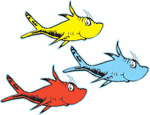The following is an excerpt from OpinionJournal.com’s “Best of the Web” written by the editor, James Taranto.
 Unfortunately, No One Will Hear Them Under Water
Unfortunately, No One Will Hear Them Under Water
“Fish’s DNA May Explain How Fins Turned to Feet”–headline, New York Times, April 18
Answers to Questions Nobody Is Asking
“Hop, Skip or Jump? Study Says No to All of the Above”–headline, Massachusetts Institute of Technology press release, April 17
Longest Books Ever Written
“The Wit of James Taranto”–headline, FromaHarrop.com, April 15
A Fly in the Ointment
Tara Parker-Pope, a science blogress for the New York Times, reports on a fascinating new study–conducted by a high school student:
Ria Chhabra, a middle school student near Dallas, heard her parents arguing about the value of organic foods, [and] she was inspired to create a science fair project to try to resolve the debate. . . .
The research, titled “Organically Grown Food Provides Health Benefits to Drosophila melanogaster,” tracked the effects of organic and conventional diets on the health of fruit flies. By nearly every measure, including fertility, stress resistance and longevity, flies that fed on organic bananas and potatoes fared better than those who dined on conventionally raised produce.
As Parker-Pope explains, fruit flies make great guinea pigs because they don’t live very long. That means new generations come along with great speed, allowing scientists to study evolutionary effects.
On the other hand, they might not have been the ideal subjects for this experiment. After all, one of the central differences between organic and regular produce is that the former don’t use pesticides. As the nerds like to say, the fact that fruit flies don’t thrive on regular produce is a feature, not a bug.
For more “Best of the Web” click here and look for the “Best of the Web Today” link in the middle column below “Today’s Columnists.



